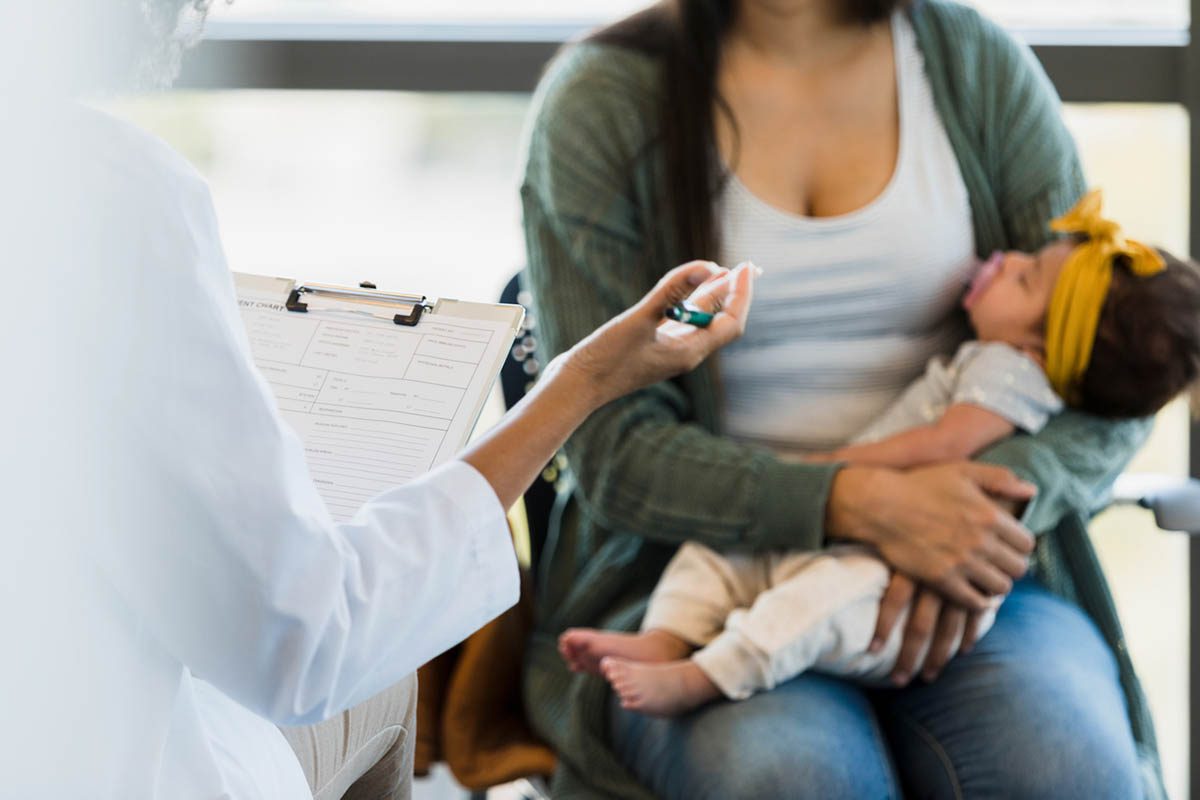As perinatal psychiatry has been a robustly developing field, there is now a large body of evidence for the acknowledgement of reproductive and hormonally related disorders such as postpartum depression, premenstrual dysphoric disorder (PMDD), and perimenopausal depression.1–4 There is growing attention to perinatal anxiety and obsessive-compulsive disorder.5,6 Postpartum psychosis has been historically represented in the literature yet remains understudied due to its relative rarity.7,8
Even more uncommon, there seems to be an understudied phenomenon of pregnancy-related extreme dysphoria or depression, distinct from typical major depressive episodes (MDEs). This appears to be an illness sometimes observed by perinatal healthcare providers although it has yet to be well characterized or researched. While less frequently encountered than postpartum depression or even antenatal MDEs more consistent with major depressive disorder (MDD), it appears that a distinct severe mood disorder may affect some pregnant individuals. While some of the aforementioned disorders are most differentiated from MDD by timing as anchored to reproductive events, there may also be qualitative differences that are imperative to understand in order to better predict who will be at risk of experiencing them and how to treat most optimally.
While postpartum depression may be related to the hormonal changes following childbirth for some women, it appears to be a heterogeneous disorder with not all women clearly having the same vulnerability to hormonal changes.9 Also, PMDD is triggered by the hormonal changes of sex hormones during the luteal phase of the menstrual cycle, yet only affects a minority of women, suggesting a vulnerability to hormonal changes rather than a direct effect.10
Notably, it has been long recognized that women are not protected from the experience of mood episodes during pregnancy.11
Here, it is hypothesized that for some women, there might be a particular vulnerability for severe depression starting in early pregnancy, illustrated by case vignettes. Patients have been de identified and cases simplified for illustrative purposes.
Case Vignette 1. Ms A presented as a 38-year-old married mother of 1 male child. She presented 5 weeks into a pregnancy conceived via in vitro fertilization (IVF). She had recently moved into the local area from another region in the country and was establishing psychiatric care. She noted extremely low mood and suicidal ideation (SI) without intent. This dysphoric mood persisted continually, and it had onset at about 2 weeks after a positive pregnancy test following the IVF procedures.
This dysphoric mood with sudden and severe onset occurred previously in a similar course after 2 previous cycles of IVF in which pregnancies occurred. She had experienced such severe symptoms of depression with abrupt onset in the first half of the first trimesters with each of those 2 pregnancies that although she had conceived via IVF, she elected to terminate the pregnancies due to her severe depressive symptoms and SI. Remission from depression was rapid after pregnancy termination. Despite the stress and trauma of the extreme symptoms and termination of wanted pregnancies, Ms A and her husband were still determined to have another child.
She again pursued IVF and became pregnant in the current pregnancy, and experienced sudden and severe onset of depressive symptoms and SI, and presented for a perinatal psychiatry consultation. She wanted to understand her treatment options for the management of depression, although she was seriously again contemplating termination of the pregnancy due to her extremely dysphoric and unrelenting mood state. Because the pregnancy was greatly wanted, she was motivated to pursue treatment, and started sertraline, as well as cognitive behavioral therapy. She had previously been told that she could not take an antidepressant during pregnancy and had not pursued pharmacologic treatment options during the 2 previous pregnancies with a similar course.
She was not actively suicidal but continued to experience distress and persistent low mood throughout the remainder of her pregnancy, albeit with modest improvement on her mood. Although she was able to function throughout the pregnancy in her family and occupational roles, she was unable to experience joy or excitement about the pregnancy. She continued sertraline and cognitive behavioral therapy into the postpartum, and approximately 1 month after delivery noted substantial improvement in mood. She was remitted from depression within 2–3 months following delivery. After the severe and prolonged experiences of dysphoria and SI during wanted pregnancies conceived with IVF (2 terminated and 1 resulting in a live birth of a healthy child), she decided she would not have more children.
She remained free of depressive episodes until experiencing mild depression around age 52 years when she started experiencing menstrual cycle irregularities consistent with the perimenopausal transition along with occasional vasomotor symptoms. She did not pursue hormonal treatment due to lack of both severity of perimenopausal symptoms and desire to trial a hormonal therapy in consideration of her past experiences with mood worsening during pregnancy. Her symptoms were successfully treated with low-dose sertraline.
In regard to other psychiatric history, she experienced moderate postpartum depression after the birth of her first son and had no prior episodes of MDD outside of pregnancies. She had no history of mania, hypomania, psychosis, abuse, or trauma. She had experienced mild premenstrual mood worsening that did not interfere with functioning, lasting 2–3 days during the late luteal phase of her cycle.
Individuals with severe dysphoria and depressive symptoms starting during pregnancy and resolving after childbirth appear rare, although 2 other cases share characteristics.
Case Vignette 2. Ms B presented with a wanted spontaneously conceived planned pregnancy. She was a 32-year old married health care provider who previously only experienced mild generalized anxiety. She had an onset of severe dysphoria and anxiety in the first several weeks of pregnancy. She was considering termination of the pregnancy due to the severity of her symptoms. Despite treatment with a selective serotonin reuptake inhibitor (SSRI) and psychotherapy, she only modestly improved throughout her pregnancy and noted relief only after about 2 months after delivery. She decided not to have another pregnancy in consideration of the level of distress she felt throughout the pregnancy. She did not experience clinically significant depressive symptoms or anxiety for the following 2 years and was lost to follow up after that time, since she did not feel she needed ongoing psychiatric treatment.
Case Vignette 3. Ms C was a mother of 2 children who traveled from a rural area to a tertiary care hospital for perinatal psychiatric care. She was experiencing severe onset of dysphoria after spontaneously conceiving a wanted pregnancy. She was unable to function and had never experienced an MDE previously. She had an appointment for an elective termination of the pregnancy scheduled for several days after the consultation, made in consideration of the level of psychiatric distress she experienced. After learning of treatment options for depression during pregnancy, Ms C decided to start an SSRI and psychotherapy. She improved somewhat, but the depression and anxiety did not fully remit until 3 months after delivery. She decided not to have another pregnancy due to the prolonged and severe dysphoria she experienced and had previously decided that 3 children was her ideal family size. She did not experience another depressive episode during the 7 years to follow, and after that time discontinued treatment and monitoring because she did not feel she needed to continue.
Discussion
In all of these cases, the distress of the mood symptoms and hopelessness were severe enough for each patient to consider termination of a wanted pregnancy. In the first case of Ms A, she had undergone termination of 2 pregnancies conceived via IVF. This condition appears to be rare, and for most women who experience depression during pregnancy, there does not appear to be this pattern of timing of onset, persistence, or hopelessness. It is also atypical for standard treatments to have such limited benefit during pregnancy, at least in these 3 cases in which the patients could function and get through to delivery, yet not thrive during pregnancy, and only experienced robust improvement after delivery. Notably, in each case, the patients decided not to pursue subsequent pregnancies.
These cases point to both the potential role of reproductive hormones and events on mood episodes, as well as underscoring the heterogeneity individuals experience in terms of psychiatric vulnerability during pregnancies. More research is needed to inform patient-centered care throughout the reproductive years and to aid individuals in treatment around pregnancy and childbirth.
In order to adequately research topics such as these, our precision in nosology and phenotyping will need to advance. While DSM-5 includes a perinatal qualifier, the emphasis is on the latter pregnancy and the postpartum, rather than disorders that occur with onset early in pregnancy and abatement after childbirth. Others have expertly argued that the peripartum specifier falls short in enabling the clinical and research goals of distinguishing the biological determinants of psychiatric disorders that impact antenatal and postpartum manifestations of illness.12,13
Description of this phenomenon may create momentum for future research. Indeed, it took decades to formally recognize PMDD as a distinct psychiatric disorder.14
Importantly, it would be critical to know how often extreme dysphoria of pregnancy occurs, and whether it can be differentiated substantially from MDD with onset during pregnancy. Additionally, there may be a role for the hormonal changes of pregnancy that impact some women yet not most, and an understanding of the factors that underscore such vulnerability would serve our field. Most observational and qualitative studies would be impactful next steps in understanding this phenomenon. If roles in the etiology were better understood, targeted treatments could be developed. It is not clear what the potential role of specific antidepressants or neurosteroids might be in this situation. Nonpharmacologic approaches would be important to explore considering fetal exposure of treatments during pregnancy.
Article Information
Published Online: June 10, 2024.
https://doi.org/10.4088/JCP.23com15238
© 2024 Physicians Postgraduate Press, Inc.
J Clin Psychiatry 2024;85(3):23com15238
Submitted: December 28, 2023; accepted March 11, 2024.
To Cite: Freeman MP. Extreme dysphoria of pregnancy: a distinct syndrome warranting attention? J Clin Psychiatry. 2024;85(3):23com15238.
Author Affiliation: Massachusetts General Hospital and Harvard Medical School, Boston, Massachusetts.
Corresponding Author: Marlene P. Freeman, MD, Massachusetts General Hospital and Harvard Medical School, 55 Fruit St, Boston, MA 02114 ([email protected]).
Relevant Financial Relationships: Relationships in the last 36 months: Dr Freeman is an employee of Massachusetts General Hospital (MGH) and works with the MGH National Pregnancy Registry. Current sponsors of the MGH National Pregnancy Registry are Alkermes, Inc (2016–present); Eisai, Inc (2022–present); Johnson & Johnson/Janssen Pharmaceuticals, Inc (2019–present); Otsuka America Pharmaceutical, Inc (2008–present); Sage Therapeutics (2019–present); Sunovion Pharmaceuticals, Inc (2011–present); Supernus Pharmaceuticals (2021–present); and Teva Pharmaceutical Industries Ltd (2018–present). Past sponsors were Forest/Actavis/ Allergan (2016–2018, declined to sponsor: 2018–present), AstraZeneca Pharmaceuticals (2009–2014, declined to sponsor: 2014–Present); AuroMedics Pharma LLC (2021–2022, declined to sponsor 2022–present); Aurobindo Pharma (2020–2022, declined to sponsor: 2022–present); Ortho-McNeil Janssen Pharmaceuticals, Inc (2009–2014, declined to sponsor: 2015–present); and Pfizer, Inc (2009–2011, declined to sponsor: 2012–present); updated sponsors can be found at https://womensmentalhealth.org/research/pregnancyregistry/. As an employee of MGH, Dr Freeman works with the MGH CTNI and MGH Center for Women’s Mental Health, which has had research funding from multiple pharmaceutical companies and National Institute of Mental Health. Dr Freeman has received research support through MGH from Sage. She has been on Independent Data Safety and Monitoring Committees for Janssen (Johnson & Johnson), Novartis, and Neurocrine and served on advisory boards/done consulting for Eliem, Sage, Brainify, Everly Health, Tibi Health, Relmada, Beckley Psytech, and Brii Biotech. She has participated in educational activities (speaking, planning) for WebMD, Medscape, Pri-Med, Postpartum Support International, PRIME, HMP Global, and CME Institute. She has received scale royalties, through MGH, for The Massachusetts General Hospital Female Reproductive Lifecycle and Hormones Questionnaire (Freeman et al 2013).
Funding/Support: None.
References (14)

- McEvoy K, Osborne LM, Nanavati J, et al. Reproductive affective disorders: a review of the genetic evidence for premenstrual dysphoric disorder and postpartum depression. Curr Psychiatry Rep. 2017;19(12):94. PubMed
- Schiller CE, Johnson SL, Abate AC, et al. Reproductive steroid regulation of mood and behavior. Compr Physiol. 2016;6(3):1135–1160. PubMed CrossRef
- Hall E, Steiner M. Psychiatric symptoms and disorders associated with reproductive cyclicity in women: advances in screening tools. Womens Health (Lond). 2015;11(3):397–415. PubMed CrossRef
- Gordon JL, Girdler SS, Meltzer-Brody SE, et al. Ovarian hormone fluctuation, neurosteroids, and HPA axis dysregulation in perimenopausal depression: a novel heuristic model. Am J Psychiatry. 2015;172(3):227–236. PubMed CrossRef
- Fairbrother N, Janssen P, Antony MM, et al. Perinatal anxiety disorder prevalence and incidence. J Affect Disord. 2016;200:148–155. PubMed CrossRef
- Fairbrother N, Collardeau F, Albert AYK, et al. High prevalence and incidence of obsessive-compulsive disorder among women across pregnancy and the postpartum. J Clin Psychiatry. 2021;82(2):20m13398. PubMed CrossRef
- Spinelli M. Postpartum psychosis: a diagnosis for the DSMV. Arch Womens Ment Health. 2021;24(5):817–822. PubMed CrossRef
- VanderKruik R, Barreix M, Chou D, et al; Maternal Morbidity Working Group. The global prevalence of postpartum psychosis: a systematic review. BMC Psychiatry. 2017;17(1):272. PubMed CrossRef
- Schiller CE, Meltzer-Brody S, Rubinow DR. The role of reproductive hormones in postpartum depression. CNS Spectr. 2015;20(1):48–59. PubMed CrossRef
- Hantsoo L, Payne JL. Towards understanding the biology of premenstrual dysphoric disorder: from genes to GABA. Neurosci Biobehav Rev. 2023;149:105168. PubMed CrossRef
- Cohen LS, Wang B, Nonacs R, et al. Treatment of mood disorders during pregnancy and postpartum. Psychiatr Clin North Am. 2010;33(2):273–293. PubMed CrossRef
- Sharma V, Mazmanian D. The DSM-5 peripartum specifier: prospects and pitfalls. Arch Womens Ment Health. 2014;17(2):171–173. PubMed CrossRef
- Stowe ZN. Perinatal mental health: advances and opportunities. Am J Psychiatry. 2023;180(12):874–877. PubMed CrossRef
- Endicott J, Amsterdam J, Eriksson E, et al. Is premenstrual dysphoric disorder a distinct clinical entity? J Womens Health Gend Based Med. 1999;8(5):663–679. PubMed CrossRef
This PDF is free for all visitors!





